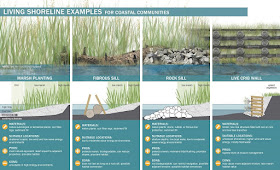 |
| Mississippi River, Alton, Illinois. May 2011. |
My intermittent series on "the disappearing of Louisiana" is about the effects of nature and man on Louisiana's land and waters. Restore or Retreat says that Louisiana loses 25 to 35 square miles of land a year, nearly a football field every hour.
 |
| Mississippi River, Alton, Illinois. May 2011. |
Where does the land go? ...... It is sinking under water. It is drowning.
To get a handle on all this, I need to learn new words such as those to describe ways to protect coastlines or defend against high water:
Breakwaters: A breakwater is an "offshore structure which is aligned parallel to the shoreline. A fixed breakwater refers to one generally constructed of stone ... . Floating breakwaters [are] firmly anchored and may be constructed of tires, logs, ... or other floating materials."
There doesn't seem to be consensus on the efficacy of breakwaters, as they can cause collateral problems.
Freeboard: "The height above the recorded high-water mark of a structure (such as a dam) associated with the water." In construction on land, "freeboard is elevating a building's lowest floor above predicted flood elevations by a small additional height, [such as] 1-3 feet above National Flood Insurance Program minimum height requirements."
Revetments: "Structures placed on banks or bluffs in such a way as to absorb the energy of incoming waves. They are usually built to preserve the existing uses of the shoreline and to protect the slope. Like seawalls, revetments armor and protect the land behind them."
 |
| Revetment design. Credit: Pile Buck Magazine |
There are different kinds of revetments. For example, in the New Orleans area, the Corps of Engineers use concrete mat revetments and trenchfill revetments.
Riprap. Here is a rather grand definition of riprap from Arundel Marine: a protective mound of stones, randomly placed to prevent erosion at a structure or embankment. ... And here is a more prosaic description, which I adapted from wikipedia: rubble used to armor a shoreline. It feels good to say rubble and riprap in one sentence and have it actually mean something.
 |
| Shoreline protection Cypremort Point State Park, Louisiana |
The difference between breakwaters and revetments: "In coastal engineering, a revetment is a land backed structure whilst a breakwater is a sea backed structure (i.e., water on both sides)." Source: wikipedia.
Sills: A sill is a "perched beach," where a beach is built up to be at a higher level then the water.
 |
| Sills. Credit: NH Coastal Adaptation Workgroup |
Related posts
Disappearing Louisiana, Part 1: Stumbling on History
Disappearing Louisiana, Part 2: Water Words
Disappearing Louisiana, Part 3: Paradise Faded: The Fight for Louisiana
Disappearing Louisiana, Part 4: Revetments, Rip-rap, and Other Exotica
Disappearing Louisiana, Part 5: The Control of Nature: Atchafalaya
No comments:
Post a Comment